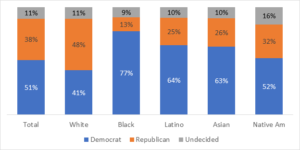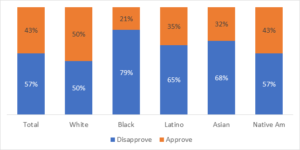A recording of today’s call is available here
The slides from the presentation are available here
Today, the NAACP released results from a new poll, conducted for the NAACP by the African American Research Collaborative and Latino Decisions, pulling data from voters in 61 of the nation’s most competitive midterm races. The poll analyzed views of African American, White, Latino, Asian American, and Native American voters in these districts, which will ultimately decide which party controls the House.
Resources
Key Takeaways
There is a 13 point advantage for the Democratic candidate over the Republican candidate (51% to 38% with 11% undecided) in the House race among all voters, with differences by race/ethnicity.
Trump’s approval numbers are underwater for all voters of color, and for no racial/ethnic group of voters surveyed does he have majority approval.
Large majorities of voters of all racial and ethnic groups in the most competitive House districts report that they have not been contacted by anyone from a campaign, political party, or community organization to ask them to vote or to register to vote.
Voters across all racial and ethnic groups believe Trump is setting race relations back. Three quarters of African Americans, Latinos and Asian Americans believe Trump is setting race relations back while a small majority of white voters believe so. Black women (89%), in particular, feel disrespected by President Trump. This is a likely contributor to why African American women voters have had high turnout in recent off year and special elections – witness Alabama and Virginia.
Trump’s strategy of trotting out black people to support him is not working, if it is intended to inspire African American support for him or his policies. Black celebrities like Kanye West or Dennis Rodman who support Trump do not help Trump’s support among African American voters. To the contrary, more than three times as many black voters say that black celebrities speaking on Trump’s behalf makes them less interested in listening to or supporting Trump’s ideas than black voters who say it would make them more open to listening to or supporting Trump’s ideas. A majority of black voters say these celebrities have no impact.
A positive message on immigrants that focuses on the similarities between immigrants and all Americans is broadly popular across all ethnic and racial groups. Such messages appear to provide strong inoculation against anti-immigrant messages that focus on immigrants taking jobs away from other Americans or immigrants hurting our economy. All groups disagree with the Trump administration’s policy of separating immigrant and asylum-seeking parents from their children at the border. African Americans have the strongest negative reactions to the policy.
Derrick Johnson, NAACP President and CEO, said, “Our analysis shows President Trump’s racism is a major factor in both why and how people will vote in the midterm elections. The poll confirms how Trump’s racism has not only divided the nation and polluted policy, but also serves as a key factor in motivating voters of color to disrupt politics as usual on a national scale.”
Jamal R. Watkins, NAACP Vice President of Civic Engagement, said, “Black voters and voters of color will play a key role in the midterm elections. There is a huge opportunity for us to address the voter’s feelings of disenchantment and disrespect by the president and the political establishment as a means to motivate them to take action at the polls. Since the conclusion of the 2016 Presidential cycle we have been traumatized by those in Washington who continue to try and divide us by race and class. Our response has to be to replace these bad actors come this November. When we vote we win!”
Henry Fernandez, Principal, African American Research Collaborative, said, “One of the most interesting findings in our survey is that African American women have the highest negative reactions to Trump. When asked whether Trump has ever made them feel ‘disrespected,’ fully 89% of African American women said ‘YES.’ No other group was close to this percentage. This is a new finding that may have huge implications. Trump’s disrespect would appear to be a major motivator for black women to turn out to vote. Given the high turnout of black women in the 2017 Alabama Senate election for example, Trump’s perceived disrespect may have helped flip Alabama’s Senate seat to the Democrats and may be putting the Senate in play in November.”
Professor Ray Block, Jr., University of Kentucky, African American Research Collaborative & Latino Decisions, said, “Racial animus was used to mobilize voters in 2016, and the evidence from this poll shows that the backlash against racial animus could be used to mobilize African American voters.”
2,045 registered voters were interviewed in the 61 congressional districts deemed most competitive by Cook, CNN and Crystal Ball, and the overall poll has a margin of error of +/- 2.1%



